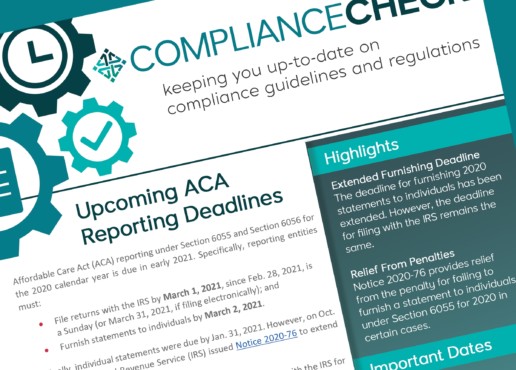ACA Reporting Deadlines Quickly Approaching
Affordable Care Act (ACA) reporting under Section 6055 and Section 6056 for the 2020 calendar year is due in early 2021. Specifically, reporting entities must:
- File returns with the IRS by March 1, 2021, since Feb. 28, 2021, is a Sunday (or March 31, 2021, if filing electronically); and
- Furnish statements to individuals by March 2, 2021.
Originally, individual statements were due by Jan. 31, 2021. However, on Oct. 2, 2020, the Internal Revenue Service (IRS) issued Notice 2020-76 to extend the furnishing deadline.
Notice 2020-76 does not extend the due date for filing forms with the IRS for 2020. Notice 2020-76 also provides additional penalty relief related to furnishing forms to individuals under Section 6055.
Action Steps
Despite the delay, the IRS is encouraging reporting entities to furnish statements as soon as they are able. No request or other documentation is required to take advantage of the extended deadline.
Section 6055 and 6056 Reporting
- Section 6055 applies to providers of minimum essential coverage (MEC), such as health insurance issuers and employers with self-insured health plans. These entities generally use Forms 1094-B and 1095-B to report information about the coverage they provided during the previous year.
- Section 6056 applies to applicable large employers (ALEs)—generally, those employers with 50 or more full-time employees, including full-time equivalents, in the previous year. ALEs use Forms 1094-C and 1095-C to report information relating to the health coverage that they offer (or do not offer) to their full-time employees.
The ACA’s individual mandate penalty was reduced to zero beginning in 2019. As a result, the IRS has been studying whether and how the Section 6055 reporting requirements should change, if at all, for future years. Despite the elimination of the individual mandate penalty, Section 6055 reporting continues to be required, although transition relief from penalties is available in some situations, as described below. Under this relief, individual statements do not have to be furnished if certain requirements are met.
Standard Deadlines
Generally, forms must be filed with the IRS annually, no later than Feb. 28 (March 31, if filed electronically) of the year following the calendar year to which the return relates. In addition, reporting entities must also furnish statements annually to each individual who is provided MEC (under Section 6055), and each of the ALE’s full-time employees (under Section 6056). Individual statements are generally due on or before Jan. 31 of the year immediately following the calendar year to which the statements relate.
As noted above, individual statements do not have to be provided under Section 6055 if certain requirements are met.
However, filing with the IRS is still required, and this relief does not apply to Section 6056.
Extended Furnishing Deadline
The IRS has again determined that some employers, insurers and other providers of MEC need additional time to gather and analyze the information, and prepare 2020 Forms 1095-B and 1095-C to be furnished to individuals. For 2020, the furnishing deadline was Feb. 1, 2021, since Jan. 31, 2021, is a Sunday. Notice 2020-76 provides an additional 30 days for furnishing the 2020 Form 1095-B and Form 1095-C, extending the due date from Feb. 1, 2021, to March 2, 2021.
Despite the delay, employers and other coverage providers are encouraged to furnish 2020 statements to individuals as soon as they are able.
Filers are not required to submit any request or other documentation to the IRS to take advantage of the extended furnishing due date provided by Notice 2020-76. Because this extended furnishing deadline applies automatically to all reporting entities, the IRS will not grant additional extensions of time of up to 30 days to furnish Forms 1095-B and 1095-C. As a result, the IRS will not formally respond to any requests that have already been submitted for 30-day extensions of time to furnish statements for 2020.
Impact on the Filing Deadline
The IRS has determined that there is no need for additional time for employers, insurers and other providers of MEC to file 2020 forms with the IRS. Therefore, Notice 2020-76 does not extend the due date for filing Forms 1094-B, 1095-B, 1094-C or 1095-C with the IRS for 2020.
This due date remains:
- March 1, 2021, if filing on paper (since Feb. 28, 2021, is a Sunday); or
- March 31, 2021, if filing electronically.
Because the due dates are unchanged, potential automatic extensions of time for filing information returns are still available under the normal rules by submitting a Form 8809. The notice also does not affect the rules regarding additional extensions of time to file under certain hardship conditions.
Penalty Relief Regarding the Furnishing Requirement Under Section 6055 for 2020
The individual mandate penalty has been reduced to zero, beginning in 2019. As a result, an individual does not need the information on Form 1095-B in order to calculate his or her federal tax liability or file a federal income tax return. However, reporting entities required to furnish Form 1095-B to individuals must continue to expend resources to do so.
Therefore, Notice 2020-76 provides relief from the penalty for failing to furnish a statement to individuals as required under Section 6055 for 2020 in certain cases. Specifically, the IRS will not assess a penalty under Section 6722 against reporting entities for failing to furnish a Form 1095-B to responsible individuals in cases where the following two conditions are met:
- The reporting entity prominently posts a notice on its website stating that responsible individuals may receive a copy of their 2020 Form 1095-B upon request, accompanied by an email address and a physical address to which a request may be sent, as well as a telephone number that responsible individuals can use to contact the reporting entity with any questions; and
- The reporting entity furnishes a 2020 Form 1095-B to any responsible individual upon request within 30 days of the date the request is received. The reporting entity may furnish these statements electronically if it meets the requirements for electronic furnishing.
ALEs that offer self-insured health plans are generally required to use Form 1095-C, Part III, to meet the Section 6055 reporting requirements, instead of Form 1095-B. This 2020 Section 6055 furnishing penalty relief does not extend to the requirement to furnish Forms 1095-C to full-time employees. As a result, for full-time employees enrolled in self-insured health plans, penalties will continue to be assessed consistent with prior enforcement policies for any failure by ALEs to furnish Form 1095-C, including Part III, according to the applicable instructions. However, the 2020 Section 6055 furnishing penalty relief does extend to the requirement to furnish the Form 1095-C to any non-full-time employees enrolled in an ALE’s self-insured health plan, subject to the requirements of the 2020 Section 6055 furnishing penalty relief.
The 2020 Section 6055 furnishing penalty relief also does not affect the requirement or the deadline to file the 2020 Forms 1094-B, 1095-B, 1094-C or 1095-C, as applicable, with the IRS.
The Saxon Advisor - April 2020
Compliance Check
Easy to Digest, Monthly Need-to-Knows
The Current 30
APRIL 1: Required Minimum Distribution. Deadline to take first RMD for terminated participants following attainment of age 70 1/2 or retiring after 70 1/2 in prior calendar year.
APRIL 1: Form 1099-R. Deadline for employers to file electronically with the IRS.
APRIL 15: Excess Contribution Refunds (Over IRS Limit). Deadline to return excess retirement plan deferrals for the previous plan year.
APRIL 30: Annual Audit Time! For large 5500 filers, it is time to select an auditor and schedule your annual audit.
A Look Forward
MAY 15: Participant-Directed Plans. Benefit Statements for participant-directed plans and Participant Fee Disclosures are due.
JUNE 30: Eligible Automatic Contribution Arrangement (EACA). Corrective distributions for failed ADP/ACP tests must be made within 6 months after the Plan Year end.
JULY 31: Form 5500 and Form 5558. The deadline for the 2019 plan year’s Form 5500 and Form 5558 (5500 filing extension to October 15th).
JULY 31: Form 8955-SSA. Deadline to file Form 8955-SSA and the terminated vested participant statements for the plan year of 2019 (unless extended by Form 5558).
JULY 31: Form 5330. Deadline to file for excise tax on failed ADP/ACP test.
In this Issue
- It’s Annual Audit Time! For large 5500 filers, it is time to select an auditor and schedule your annual audit April 30, 2020.
- Benefit Statements for participant-directed plans and Participant Fee Disclosures are due May 15, 2020.
- Fresh Brew Featuring Olivia Childs
- This month’s Saxon U: How To Legally Work With Gig And Contract Workers
- #CommunityStrong: Donation Drive for Families Forward
How to Legally Work With Gig and Contract Workers
Join our May Saxon University as Pandy Pridemore discusses how to legally work with Gig and Contract Workers
What You Need to Know: The SECURE Act
Bringing the knowledge of our in-house advisors right to you...
In December of 2019, President Donald Trump passed the Setting Every Community Up for Retirement Enhancement Act or SECURE Act. Some of the Act aims at making it easier for small business owners to create more affordable and easier to administer retirement plans.
“There is a lot of hype in the government and media about how the SECURE Act will make it cheaper to sponsor a plan. I don’t know if recordkeepers could lower their annual costs any more than they have over the last 8 or 9 years; but it definitely will provide lower start-up costs through the tax credits, and make it easier to administer plans if utilizing a Safe Harbor approach or a PEP.”
Fresh Brew Featuring Olivia Childs
"Be sure to do the follow-up after a conversation!"
Olivia Childs is a Saxon Senior Solutions Specialist whose favorite catchphrase is, “We rise by lifting others,” by Eleanor Roosevelt. We invite you take a moment to get to know Olivia!
Olivia’s favorite brew is Chai Tea Latte. She admits that enjoying her drink while relaxing at Half Day Cafe and snacking on an Everything Bagel is hard to beat!
This Month's #CommunityStrong:
Donation Drive for Families Forward
It's time to work together to help meet a top priority need of a valued community program and the families they serve.
Are you taking a strategic approach to your financial big picture?
Saxon creates innovative strategies that will help you figure out how to get there, plan for the risks along the way, navigate complex tax code and understand the steps you need to take to protect and secure your future.
Monthly compliance alerts, educational articles and events
- courtesy of Saxon Financial Advisors.

The Saxon Advisor - March 2020
Compliance Check
what you need to know
Section 6055/6056 Reporting (Electronic Filing Deadline). Applicable large employers (ALEs) that sponsor self-insured health plans are required by Internal Revenue Code Sections 6055 and 6056 to report information about the coverage to the IRS yearly. IRS Forms 1094-C and 1095-C are used to report coverage information. March 31, 2020, is the deadline to submit these forms if employers are filing electronically.
COBRA General Notice. Employers who provide group health plans must provide a written General Notice of COBRA rights to all covered employees and spouses (if applicable). This notice must be provided 90 days after health plan coverage begins.
Summary Plan Description (SPD). Employers who offer group health plans that are subject to ERISA must provide Summary Plan Descriptions (SPD) to employees who newly enrolled at the beginning of the plan year by March 31, 2020.
Form 1099-R (Electronic Filing Deadline). Employers must file Form 1099-R with the IRS by March 31, 2020, if they are filed electronically.
Form 5330 Excise Tax Return. The Form 5330 excise tax return and payment for excess 2018 ADP/ACP contributions are due March 31, 2020.
Excess Contribution Refunds (over IRS limit). April 15, 2020 is the deadline to return excess retirement plan contributions for elective deferrals exceeding the 402(g) limits.
In this Issue
- Upcoming Compliance Deadlines
- Paving the Road to a Successful Portfolio Featuring Brian Bushman
- Upcoming Saxon U Webinar: Employee Navigator Workshop with Jake Meyer
- Fresh Brew Featuring Jake Meyer
- #CommunityStrong: American Heart Association Heart Mini Fundraising & School Donation Drive
Employee Navigator Workshop
Join us for this interactive and educational Saxon U webinar with Jake Meyer, Saxon Financial Services, as we walk you through certain aspects of Navigator and teach you how to use the most common features.
Paving the Road to a Successful Portfolio
Bringing the knowledge of our in-house advisors right to you...
Determining a proper asset allocation is an important first step in creating your portfolio and planning how it will grow in the future. Asset allocation is the process of diversifying your investments into different asset classes based on the investor’s time horizon, their goals and how much risk they can tolerate.
“People always ask me what they can invest in that will make them a lot of money without the chance of losing any,” said Brian Bushman, Saxon Financial Advisor.
Fresh Brew Featuring Jake Meyer
“Educate your employees about their benefits. The more they understand them, the more they will realize how big of a benefit they are.”
This month’s Fresh Brew features Jake Meyer, an Account Executive at Saxon.
Scott’s favorite brew is Rhinegeist Truth, a local Indian Pale Ale from the Rhinegeist Brewery in Cincinnati, Ohio.
Jake doesn’t have a particular snack that he eats when sipping on his favorite brew. He instead likes to enjoy the hops in his favorite IPA.
This Month's #CommunityStrong:
American Heart Association Heart Mini Fundraising
This March, the Saxon team and their families teamed up to raise money for the American Heart Association Heart Mini!
Do you have a strategic approach to the totality of your financial picture?
Saxon creates innovative strategies that will help you figure out how to get there, plan for the risks along the way, navigate complex tax code and understand the steps you need to take to protect and secure your future.
Monthly compliance alerts, educational articles and events
- courtesy of Saxon Financial Advisors.

The Saxon Advisor - February 2020
Compliance Check
what you need to know
Section 6055/6056 Reporting. Employers must file Forms 1094-B and 1095-B, and Forms 1094-C and 1095-C with the IRS by February 28, 2020 if they are filed on paper.
Form 1099-R Paper Filing. Employers must file Form 1099-R with the IRS by February 28, 2020 if they are filed on paper.
CMS Medicare Part D Disclosure. Employers that provide prescription drug coverage must disclose to the CMS whether the plan’s prescription drug coverage is creditable or non-creditable.
Summary of Material Modifications Distribution. Employers who offer a group health plan that is subject to ERISA must distribute a SMM for plan changes that were adopted at the beginning of the year that are material reductions in plan benefits or services.
Section 6055/6056 Individual Statements (2019 EXTENDED DEADLINE). Applicable large employers (ALEs) that sponsor self-insured health plans must disclose information about plan coverage to covered employees each year. This deadline was extended from January 31, 2020, to March 2, 2020, this year by the IRS.
ADP/ACP Refunds. Corrective refunds for a failed ADP/ACP test must be made by March 15, 2020, to avoid 10 percent excise tax penalties.
Section 6055/6056 Reporting (Electronic Filing Deadline). Applicable large employers (ALEs) that sponsor self-insured health plans are required by Internal Revenue Code Sections 6055 and 6056 to report information about the coverage to the IRS yearly. IRS Forms 1094-C and 1095-C are used to report coverage information. March 31, 2020, is the deadline to submit these forms if employers are filing electronically.
COBRA General Notice. Employers who provide group health plans must provide a written General Notice of COBRA rights to all covered employees and spouses (if applicable). This notice must be provided 90 days after health plan coverage begins.
Summary Plan Description (SPD). Employers who offer group health plans that are subject to ERISA must provide Summary Plan Descriptions (SPD) to employees who newly enrolled at the beginning of the plan year.
Form 1099-R (Electronic Filing Deadline). Employers must file Form 1099-R with the IRS by March 31, 2020, if they are filed electronically.
Form 5330. The Form 5330 excise tax return and payment for excess 2018 ADP/ACP contributions are due March 31, 2020.
In this Issue
- Upcoming Compliance Deadlines
- How to Speak to Your Employees About Their Intimidating Benefits – Featuring Jamie Charlton
- Fresh Brew Featuring Nat Gustafson
- This month’s Saxon U: What Employers Should Know About the SECURE Act
- March’s Saxon U: Saxon’s Humana GO365 Annual Wellness Clinic
- #CommunityStrong: American Heart Association Heart Mini Fundraising
What Employers Should Know About the SECURE Act
Join us for this interactive and educational Saxon U seminar with Todd Yawit, Director of Employer-Sponsored Retirement Plans at Saxon Financial Services, as we discuss what the SECURE Act is and how it impacts your employer-sponsored retirement plan.
How to Speak to Your Employees About Their Intimidating Benefits
Bringing the knowledge of our in-house advisors right to you...
Employers spend thousands annually to secure and offer benefits to their employees. However, a small amount of time and money are devoted to ensuring employees understand and appreciate their benefits. Properly communicating – what you say, how you say it and to whom you say it to – can make a tremendous difference in how employees think, feel and react to their benefits, employer and fellow co-workers.
In this installment of CenterStage, Jamie Charlton, founding partner and CEO of Saxon Financial Services, discusses the importance of offering sound education of benefits to employees, as well as how to effectively communicate their benefits in a clear, concise manner.
Fresh Brew Featuring Nat Gustafson
“Always be prepared.”
This month’s Fresh Brew features Nat Gustafson, an Account Manager at Saxon.
In his free time, Nat enjoys snowboarding. When thinking about his greatest adventure, he remembers traveling around Italy. He lives by the catchphrase of, “Roll up your sleeves.”
Nat’s favorite brew is Rhinegeist Truth. His favorite local spot to grab his favorite brew is Mount Lookout Tavern on Linwood Avenue.
Nat’s favorite snack to enjoy with his brew is Chicken wings.
This Month's #CommunityStrong:
American Heart Association Heart Mini Fundraising
This January, February & March, the Saxon team and their families will be teaming up to raise money for the American Heart Association Heart Mini!
Saxon’s Humana GO365 Annual Wellness Clinic
Learn what Go365 is, how it works, how to create engaged employees and how to maximize the 15% wellness incentive credit from the program.
Monthly compliance alerts, educational articles and events
- courtesy of Saxon Financial Advisors.

The Saxon Advisor - January 2020
Compliance Check
what you need to know
Form W-2s are due January 31, 2020. January 31 is the deadline for employers to distribute Form W-2s to employees. Large employers – employers who have more than 250 W-2s – must include the aggregate cost of health coverage.
Form 1099-Rs are due January 31, 2020. Employers must distribute Form 1099-Rs to recipients of 2019 distributions.
Form 945 Distributions. Form 945s must be distributed to plan participants by January 31, 2020, for 2019 non payroll withholding of deposits if they were not made on time and in full to pay all taxes that are due.
Section 6055/6056 Reporting. Employers must file Forms 1094-B and 1095-B, and Forms 1094-C and 1095-C with the IRS by February 28, 2020 if they are filed on paper.
Form 1099-R Paper Filing. Employers must file Form 1099-R with the IRS by February 28, 2020 if they are filed on paper.
CMS Medicare Part D Disclosure. Employers that provide prescription drug coverage must disclose to the CMS whether the plan’s prescription drug coverage is creditable or non-creditable.
Summary of Material Modifications Distribution. Employers who offer a group health plan that is subject to ERISA must distribute a SMM for plan changes that were adopted at the beginning of the year that are material reductions in plan benefits or services
In this Issue
- Upcoming Compliance Deadlines
- Traditional IRA, Roth IRA, 401(k), 403(b): What’s the Difference?
- Fresh Brew Featuring Scott Langhorne
- This month’s Saxon U: What Employers Should Know About the SECURE Act
- #CommunityStrong: American Heart Association Heart Mini Fundraising
What Employers Should Know About the SECURE Act
Join us for this interactive and educational Saxon U seminar with Todd Yawit, Director of Employer-Sponsored Retirement Plans at Saxon Financial Services, as we discuss what the SECURE Act is and how it impacts your employer-sponsored retirement plan.
Traditional IRA, Roth IRA, 401(k), 403(b): What's the Difference?
Bringing the knowledge of our in-house advisors right to you...
If you haven’t begun saving for retirement yet, don’t be discouraged. Whether you begin through an employer sponsored plan like a 401(k) or 403(b) or you begin a Traditional or Roth IRA that will allow you to grow earnings from investments through tax deferral, it is never too late or too early to begin planning.
“A major trend we see is that if people don’t have an advisor to meet with, they tend to invest too conservatively, because they are afraid of making a mistake,” said Kevin Hagerty, a Financial Advisor at Saxon Financial.
Fresh Brew Featuring Scott Langhorne
“Pay close attention to detail.”
This month’s Fresh Brew features Scott Langhorne, an Account Manager at Saxon.
Scott’s favorite brew is Bud Light. His favorite local spot to grab his favorite brew is wherever his friends and family are.
Scott’s favorite snack to enjoy with his brew is wings.
This Month's #CommunityStrong:
American Heart Association Heart Mini Fundraising
This January, February & March, the Saxon team and their families will be teaming up to raise money for the American Heart Association Heart Mini! They will be hosting a Happy Hour at Fretboard Brewing Company Wednesday, January 29, from 4 p.m. - 7 p.m. to raise money.
Are you prepared for retirement?
Saxon creates strategies that are built around you and your vision for the future. The key is to take the first step of reaching out to a professional and then let us guide you along the path to a confident future.
Monthly compliance alerts, educational articles and events
- courtesy of Saxon Financial Advisors.

Compliance: Yearly Deadlines for Health Plans
Do you offer group health plans coverage to your employees? Employers that provide coverage are subject to multiple compliance requirements throughout the year. Certain requirements have been around for many years, while others have been recently added by the Affordable Care Act (ACA).
Continue reading for a summary of the many compliance requirements and their associated deadlines that health plan providers should be aware of throughout the year. Certain deadlines for non-calendar year plans may vary from what is outlined in this summary. This summary only covers recurring calendar year compliance deadlines. Other requirements that are not based on the calendar year are not included below.
January
| Deadline | Requirement | Description |
|
January 31 |
Form W-2 | Deadline for providing Forms W-2 to employees. The ACA requires employers to report the aggregate cost of employer-sponsored group health plan coverage on their employees’ Forms W-2. The purpose is to provide employees with information on how much their health coverage costs. Certain types of coverage are not required to be reported on Form W-2.
This Form W-2 reporting requirement is currently optional for small employers (those who file fewer than 250 Forms W-2). Employers that file 250 or more Forms W-2 are required to comply with the ACA’s reporting requirement. |
| January 31 | Form 1095-C or Form 1095-B—Annual Statement to Individuals | Applicable large employers (ALEs) subject to the ACA’s employer shared responsibility rules must furnish Form 1095-C (Section 6056 statements) annually to their full-time employees. Employers with self-insured health plans that are not ALEs must furnish Form 1095-B (Section 6055 statements) annually to covered employees.
The Forms 1095-B and 1095-C are due on or before Jan. 31 of the year immediately following the calendar year to which the statements relate. Extensions may be available in certain limited circumstances. However, an alternate deadline generally is not available for ALEs that sponsor non-calendar year plans.
Update: The IRS extended the deadline for furnishing the 2018 employee statements, from Jan. 31, 2019, to March 4, 2019. |
February
| Deadline | Requirement | Description |
|
February 28 (March 31, if filing electronically) |
Section 6055 and 6056 Reporting | Under Section 6056, ALEs subject to the ACA’s employer shared responsibility rules are required to report information to the IRS about the health coverage they offer (or do not offer) to their full-time employees. ALEs must file Form 1094-C and Form 1095-C with the IRS annually.
Under Section 6055, self-insured plan sponsors are required to report information about the health coverage they provided during the year. Self-insured plan sponsors must generally file Form 1094-B and Form 1095-B with the IRS annually. ALEs that sponsor self-insured plans are required to report information to the IRS under Section 6055 about health coverage provided, as well as information under Section 6056 about offers of health coverage. ALEs that sponsor self-insured plans will generally use a combined reporting method on Form 1094-C and Form 1095-C to report information under both Sections 6055 and 6056. All forms must be filed with the IRS annually, no later than Feb. 28 (March 31, if filed electronically) of the year following the calendar year to which the return relates. Reporting entities that are filing 250 or more returns must file electronically. There is no alternate filing date for employers with non-calendar year plans. |
March
| Deadline | Requirement | Description |
|
March 1 (calendar year plans) |
Medicare Part D Disclosure to CMS | Group health plan sponsors that provide prescription drug coverage to Medicare Part D eligible individuals must disclose to the Centers for Medicare & Medicaid Services (CMS) whether prescription drug coverage is creditable or not. In general, a plan’s prescription drug coverage is considered creditable if its actuarial value equals or exceeds the actuarial value of the Medicare Part D prescription drug coverage. Disclosure is due:
Plan sponsors must use the online disclosure form on the CMS Creditable Coverage webpage. |
July
| Deadline | Requirement | Description |
|
July 31 |
PCORI Fee | Deadline for filing IRS Form 720 and paying Patient-Centered Outcomes Research Institute (PCORI) fees for the previous year. For insured health plans, the issuer of the health insurance policy is responsible for the PCORI fee payment. For self-insured plans, the PCORI fee is paid by the plan sponsor.
The PCORI fees are temporary—the fees do not apply to plan years ending on or after Oct. 1, 2019. This means that, for calendar year plans, the PCORI fees do not apply for the 2019 plan year. |
|
July 31 |
Form 5500 | Plan administrators of ERISA employee benefit plans must file Form 5500 by the last day of the seventh month following the end of the plan year, unless an extension has been granted. Form 5500 reports information on a plan’s financial condition, investments and operations. Form 5558 is used to apply for an extension of two and one-half months to file Form 5500.
Small health plans (fewer than 100 participants) that are fully insured, unfunded or a combination of insured/unfunded, are generally exempt from the Form 5500 filing requirement. The Department of Labor’s (DOL) website and the latest Form 5500 instructions provide information on who is required to file and detailed information on filing. |
September
| Deadline | Requirement | Description |
|
September 30 |
Medical Loss Ratio (MLR) Rebates | The deadline for issuers to pay medical loss ratio (MLR) rebates for the 2014 reporting year and beyond is Sept. 30. The ACA requires health insurance issuers to spend at least 80 to 85 percent of their premiums on health care claims and health care quality improvement activities. Issuers that do not meet the applicable MLR percentage must pay rebates to consumers.
Also, if the rebate is a “plan asset” under ERISA, the rebate should, as a general rule, be used within three months of when it is received by the plan sponsor. Thus, employers who decide to distribute the rebate to participants should make the distributions within this three-month time limit. |
|
September 30 |
Summary Annual Report | Plan administrators must automatically provide participants with the summary annual report (SAR) within nine months after the end of the plan year, or two months after the due date for filing Form 5500 (with approved extension).
Plans that are exempt from the annual 5500 filing requirement are not required to provide an SAR. Large, completely unfunded health plans are also generally exempt from the SAR requirement. |
October
| Deadline | Requirement | Description |
|
October 15 |
Medicare Part D – Creditable Coverage Notices | Group health plan sponsors that provide prescription drug coverage to Medicare Part D eligible individuals must disclose whether the prescription drug coverage is creditable or not. Medicare Part D creditable coverage disclosure notices must be provided to participants before the start of the annual coordinated election period, which runs from Oct. 15-Dec. 7 of each year. Coverage is creditable if the actuarial value of the coverage equals or exceeds the actuarial value of coverage under Medicare Part D. This disclosure notice helps participants make informed and timely enrollment decisions.
Disclosure notices must be provided to all Part D eligible individuals who are covered under, or apply for, the plan’s prescription drug coverage, regardless of whether the prescription drug coverage is primary or secondary to Medicare Part D. Model disclosure notices are available on CMS’ website. |
Annual Notices
| Type of Notice | Description |
| WHCRA Notice | The Women’s Health and Cancer Rights Act (WHCRA) requires group health plans that provide medical and surgical benefits for mastectomies to also provide benefits for reconstructive surgery. Group health plans must provide a notice about the WHCRA’s coverage requirements at the time of enrollment and on an annual basis after enrollment. The initial enrollment notice requirement can be satisfied by including the information on WHCRA’s coverage requirements in the plan’s summary plan description (SPD). The annual WHCRA notice can be provided at any time during the year. Employers with open enrollment periods often include the annual notice with their open enrollment materials. Employers that redistribute their SPDs each year can satisfy the annual notice requirement by including the WHCRA notice in their SPDs.
Model language is available in the DOL’s compliance assistance guide. |
| CHIP Notice | If an employer’s group health plan covers residents in a state that provides a premium subsidy under a Medicaid plan or CHIP, the employer must send an annual notice about the available assistance to all employees residing in that state. the annual CHIP notice can be provided at any time during the year. Employers with annual enrollment periods often provide CHIP notice with their open enrollment materials.
The DOL has a model notice that employers may use. |
| Group health plans and health insurance issuers are required to provide an SBC to applicants and enrollees each year at open enrollment or renewal time. The purpose of the SBC is to allow individuals to easily compare their options when they are shopping for or enrolling in health plan coverage. Federal agencies have provided a template for the SBC, which health plans and issuers are required to use.
The issuer for fully insured plans usually prepares the SBC. If the issuer prepares the SBC, an employer is not also required to prepare an SBC for the health plan, although the employer may need to distribute the SBC prepared by the issuer. The SBC must be included in open enrollment materials. If renewal is automatic, the SBC must be provided no later than 30 days prior to the first day of the new plan year. However, for insured plans, if the new policy has not yet been issued 30 days prior to the beginning of the plan year, the SBC must be provided as soon as practicable, but no later than seven business days after the issuance of the policy. |
|
| Grandfathered Plan Notice | To maintain a plan’s grandfathered status, the plan sponsor or must include a statement of the plan’s grandfathered status in plan materials provided to participants describing the plan’s benefits (such as the summary plan description, insurance certificate and open enrollment materials). The DOL has provided a model notice for grandfathered plans. This notice only applies to plans that have grandfathered status under the ACA. |
| Notice of Patient Protections | If a non-grandfathered plan requires participants to designate a participating primary care provider, the plan or issuer must provide a notice of patient protections whenever the SPD or similar description of benefits is provided to a participant. This notice is often included in the SPD or insurance certificate provided by the issuer (or otherwise provided with enrollment materials).
The DOL provided a model notice of patient protections for plans and issuers to use. |
| HIPAA Privacy Notice | The HIPAA Privacy Rule requires self-insured health plans to maintain and provide their own privacy notices. Special rules, however, apply for fully insured plans. Under these rules, the health insurance issuer, and not the health plan itself, is primarily responsible for the privacy notice.
Self-insured health plans are required to send the privacy notice at certain times, including to new enrollees at the time of enrollment. Thus, the privacy notice should be provided with the plan’s open enrollment materials. Also, at least once every three years, health plans must either redistribute the privacy notice or notify participants that the privacy notice is available and explain how to obtain a copy. The Department of Health and Human Services (HHS) has model Privacy Notices for health plans to choose from. |
| HIPAA Special Enrollment Notice | At or prior to the time of enrollment, a group health plan must provide each eligible employee with a notice of his or her special enrollment rights under HIPAA. This notice should be included with the plan’s enrollment materials. It is often included in the health plan’s SPD or insurance booklet. Model language is available in the DOL’s compliance assistance guide. |
| Wellness Notice HIPAA | Employers with health-contingent wellness programs must provide a notice that informs employees that there is an alternative way to qualify for the program’s reward. This notice must be included in all plan materials that describe the terms of the wellness program. If wellness program materials are being distributed at open enrollment (or renewal time), this notice should be included with those materials. Sample language is available in the DOL’s compliance assistance guide. |
| Wellness Notice ADA | To comply with the Americans with Disabilities Act (ADA), wellness plans that collect health information or involve medical exams must provide a notice to employees that explains how the information will be used, collected and kept confidential. Employees must receive this notice before providing any health information and with enough time to decide whether to participate in the program. Employers that are implementing a wellness program for the upcoming plan year should include this notice in their open enrollment materials. The Equal Employment Opportunity Commission has provided a sample notice for employers to use. |
Resources: https://www.ada.gov/; https://www.dol.gov/; https://www.hhs.gov/hipaa/for-professionals/privacy/guidance/model-notices-privacy-practices/index.html; https://www.cms.gov/Medicare/Prescription-Drug-Coverage/CreditableCoverage/Model-Notice-Letters.html; https://www.irs.gov/retirement-plans/retirement-plan-participant-notices-when-the-end-of-the-plan-year-has-passed; https://www.cms.gov/cciio/programs-and-initiatives/health-insurance-market-reforms/medical-loss-ratio.html; https://www.dol.gov/sites/default/files/ebsa/about-ebsa/our-activities/resource-center/publications/compliance-assistance-guide.pdf; https://www.dol.gov/agencies/ebsa/laws-and-regulations/laws/affordable-care-act/for-employers-and-advisers/preexisting-condition-exclusions; https://www.dol.gov/agencies/ebsa/laws-and-regulations/laws/affordable-care-act/for-employers-and-advisers/summary-of-benefits; https://www.dol.gov/agencies/ebsa/laws-and-regulations/laws/chipra/working-group; https://www.dol.gov/agencies/ebsa/laws-and-regulations/laws/whcra; https://www.dol.gov/agencies/ebsa/employers-and-advisers/plan-administration-and-compliance/reporting-and-filing/forms; https://www.irs.gov/newsroom/patient-centered-outcomes-research-institute-fee; https://www.irs.gov/affordable-care-act/individuals-and-families/form-1095-b-what-you-need-to-do-with-this-form; https://www.irs.gov/affordable-care-act/individuals-and-families/form-1095-c-what-you-need-to-do-with-this-form; https://www.cms.gov/Medicare/Prescription-Drug-Coverage/CreditableCoverage/index.html?redirect=/CreditableCoverage/; https://www.irs.gov/affordable-care-act/questions-and-answers-on-information-reporting-by-health-coverage-providers-section-6055; https://www.irs.gov/affordable-care-act/employers/questions-and-answers-on-reporting-of-offers-of-health-insurance-coverage-by-employers-section-6056; https://www.irs.gov/forms-pubs/about-form-w-2;
The do’s and don’ts of ADA accommodations: 3 new rulings
More than 25,000 ADA charges were filed by the EEOC in the past year, despite employers best compliance efforts. Continue reading this blog post to learn more.
Employers are facing more disability discrimination lawsuits than ever – despite their best compliance efforts.
In the past year alone, over 25,000 ADA charges were filed by the EEOC.
The right way to accommodate
One area that’s often a point of contention? The accommodation process. Workers and employers can have a very different idea of how a disability should be accommodated.
And while each disability needs to be evaluated on a case by case basis, several recent court rulings shed further light on employers’ ADA accommodation responsibilities.
1. In Brumley v. United Parcel Service, a court ruled that ADA accommodations don’t necessarily have to be given to employees immediately.
Melissa Brumley delivered packages for UPS when she hurt her back lifting a heavy box from her truck.
She took leave to heal, and her doctor said when she returned to work she could no longer lift packages or drive. Since these were two essential functions of her job, Brumley’s manager put her on leave while waiting on more information from her doctor.
After beginning the interactive process and considering a reassignment, Brumley’s doctor cleared her to go back to her old job, and UPS ended the process.
But Brumley sued the company for failing to accommodate her during those weeks she was on leave, which resulted in loss of pay.
A district court ruled in favor of UPS, and on appeal, the 6th Circuit agreed. It said just because the company didn’t accommodate the employee immediately didn’t mean it violated the ADA.
UPS began the interactive process and only stopped once Brumley was cleared to go back to her old job without an accommodation.
The key things the company did? Beginning the process and requesting additional info from Brumley’s doctor – this showed the court a good faith effort to comply with the ADA.
2. In Sharbono v. Northern States Power, a court ruled a company that failed to find an accommodation didn’t fail to fulfill its ADA duties.
After a foot injury, James Sharbono wasn’t able to wear the steel-toed boots required by his company’s safety procedures.
HR worked with Sharbono and suggested several accommodations, such as altering his boots and getting a custom pair made, but none worked out. Sharbono was forced to retire, and he sued for ADA violation.
But the 8th Circuit ruled the company acted in good faith. It worked with Sharbono and suggested several accommodations. It was only after exhausting all options that Sharbono was forced to retire. The court said the company fulfilled its ADA responsibilities, despite finding no accommodation for Sharbono.
3. In Stokes v. Nielsen, a court decided companies can be required to make accommodations that cover more than just essential job functions.
Jacqueline Stokes had impaired vision and received multiple accommodations that allowed her to do her job. Stokes then requested special meeting handouts, printed in large letters, that she could read beforehand.
Despite many promises from HR, Stokes never received her requested handouts. She sued, claiming to be denied a reasonable accommodation under the ADA.
While the company argued it gave Stokes everything she needed to do her job, therefore fulfilling its ADA responsibilities, the Fifth Circuit disagreed.
“Our circuit has explicitly rejected the requirement that requested modifications must be necessary to perform essential job functions to constitute a reasonable accommodation,” it said. And Stokes’ request was deemed reasonable.
This case shows if an employee makes a reasonable request for their job, it’s easier to just grant it.
SOURCE: Mucha, R. (4 January 2019) "The do’s and don’ts of ADA accommodations: 3 new rulings" (Web Blog Post). Retrieved from https://www.hrmorning.com/the-dos-and-donts-of-ada-accommodations-3-new-rulings/







